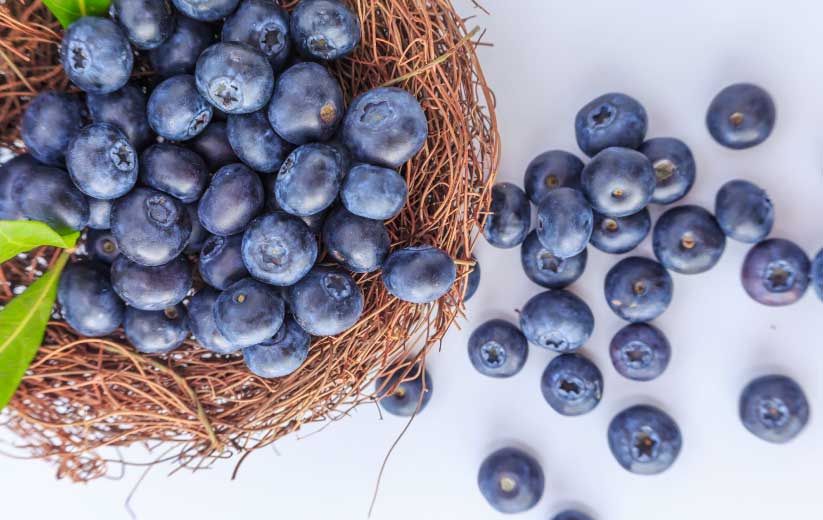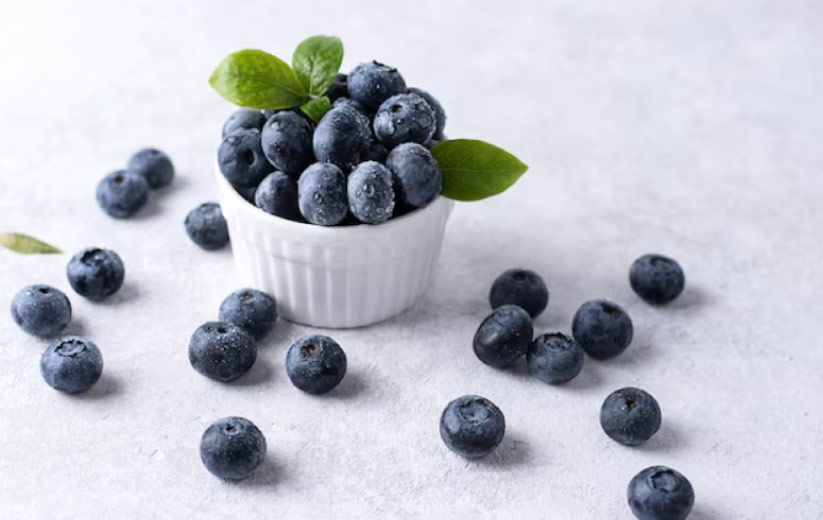Blueberries are sweet, nutritious, and extremely popular. Blueberries are considered a superfood because they are low in calories and extremely healthy. They are delicious and very easy to prepare, so many people love them.
1. Blueberries are low in calories but high in nutrients
Blueberry (Vaccinium sect. Cyanococcus) is a flowering shrub; berries of a bluish, purple color – are called blueberries. Blueberries are small, and green when they first appear. Then turns purple and green when ripe.
The two most common types are:
- Highbush Blueberries: The most commonly grown variety in America.
- Lowbush Blueberries: Usually smaller and richer in antioxidants.
Blueberries are one of the most nutrient-dense fruits. A 148-gram cup of blueberries contains:
- Fiber: 4 grams
- Vitamin C: 24% of the recommended daily dose (RDI)
- Vitamin K: 36% of the RDI
- Manganese: 25% RDI
- Small amounts of other nutrients
They are also about 85% water. One cup of blueberries contains just 84 calories, with 15 grams of carbohydrates. The low-calorie content makes blueberries an excellent source, providing several important nutrients.
2. Blueberries are considered the king of the antioxidant food group
Antioxidants protect your body from free radicals, which are unstable molecules that can damage cells in the body and cause aging and disease, such as cancer.
Blueberries are said to have the highest antioxidant content of all fruits and vegetables. The main antioxidant compounds in blueberries belong to a family of polyphenol antioxidants known as flavonoids, more specifically anthocyanins – which are abundant in blueberries, thus boosting antioxidant levels in the body. body.
3. Blueberries cause oxidative damage to DNA, help fight aging and cancer
Oxidative DNA damage is an inevitable natural process in everyday life. It is thought to happen tens of thousands of times per day in every cell in your body. Oxidative DNA damage is part of the reason we age and develop diseases like cancer.
Because blueberries are high in antioxidants, they can neutralize some of the free radicals that damage your DNA. In one study, 168 people drank 1 liter of blueberry and apple juice per day. After four weeks, DNA oxidative damage caused by free radicals was reduced by 20%. These findings are consistent with smaller studies that used fresh or powdered blueberries.

4. Blueberries protect against blood cholesterol damage
Oxidative damage is frequent and not limited to your cells and DNA. Similarly, they can also damage bad cholesterol (LDL). The oxidation of bad LDL cholesterol is a leading cause of heart disease.
The antioxidants in blueberries are very effective in reducing the oxidation level of LDL. This makes blueberries very good for your heart.
A daily 50-gram serving of blueberries reduced LDL oxidation by 27% over eight weeks in obese subjects. Another study determined that eating 75 grams of blueberries with a main meal significantly reduced the oxidation of “bad” LDL cholesterol.
5. Blueberries help lower blood pressure
Blueberries are great for people with high blood pressure – a major risk factor for heart disease. In an 8-week study, obese people with a high risk of heart disease recorded a 4% – 6% reduction in blood pressure after consuming 50 grams of blueberries per day. Other studies in postmenopausal women have also observed similar effects.
6. Blueberries may help prevent heart disease
Although eating blueberries may lower blood pressure and reduce oxidation of LDL cholesterol, it’s important to remember that blueberries reduce risk factors, not a disease.
One study of 93,600 nurses found that those with the highest intakes of anthocyanins (the main antioxidants in blueberries) had a 32% lower risk of heart attack than those with the lowest intakes. However, this was an observational study, so it cannot prove that anthocyanins alone reduce the risk mentioned above. More studies are needed to confirm these results.
7. Blueberries may help maintain brain function and improve memory
Oxidative stress can accelerate the aging process in the brain and negatively affect brain function. In animal studies, the antioxidants in blueberries affect areas in the brain where intelligence is concentrated. They appear to benefit aging nerve cells, leading to improve cell signaling.
Human studies have also yielded promising results. In one human study, nine older adults with mild cognitive impairment drank blueberry juice every day. After 12 weeks, they showed positive signs in several brain functions
A six-year study of more than 16,000 older individuals found that blueberries and strawberries reduced mental aging by up to 2.5 years.

8. Anthocyanins in blueberries may have anti-diabetic effects
Blueberries provide moderate amounts of sugar compared to other fruits. A 148-gram cup of blueberries contains only 15 grams of sugar, about the same amount as in a small apple or a large orange.
The bioactive compounds in blueberries seem to be able to block any negative effects of sugar on blood sugar control.
Research shows that anthocyanins in blueberries increase insulin sensitivity and glucose metabolism. These anti-diabetic effects are similar if you drink blueberry juice and its extracts.
Improved insulin sensitivity will help reduce the risk of metabolic syndrome and type 2 diabetes, two of the most common health problems in the world.
9. May help fight urinary tract infections
Urinary tract infections are a common problem among women. It is known that cranberry juice can help prevent various types of infections in patients with urinary tract diseases.
Blueberries have many of the same ingredients as cranberries, which have many of the same active ingredients as cranberry juice. These substances, called anti-adhesives, work to prevent bacteria like E. coli from binding to the wall of your bladder.
There is relatively little research on the effects of blueberries on urinary tract infections, but this effect in blueberries may be similar to those in cranberries.
10. Blueberries may reduce muscle damage after strenuous exercise
Strenuous exercise can lead to muscle soreness and fatigue, due to local inflammation and oxidative stress in your muscle tissue. Supplementing with blueberries can reduce the damage that occurs at the molecular level, minimizing soreness and reducing muscle performance. In a small study of 10 female athletes, blueberries accelerated muscle recovery after strenuous leg exercises.
Follow the website ongreenbeauty.com to get more health, nutrition, and beauty information to protect the health of yourself and your loved ones in your family.




